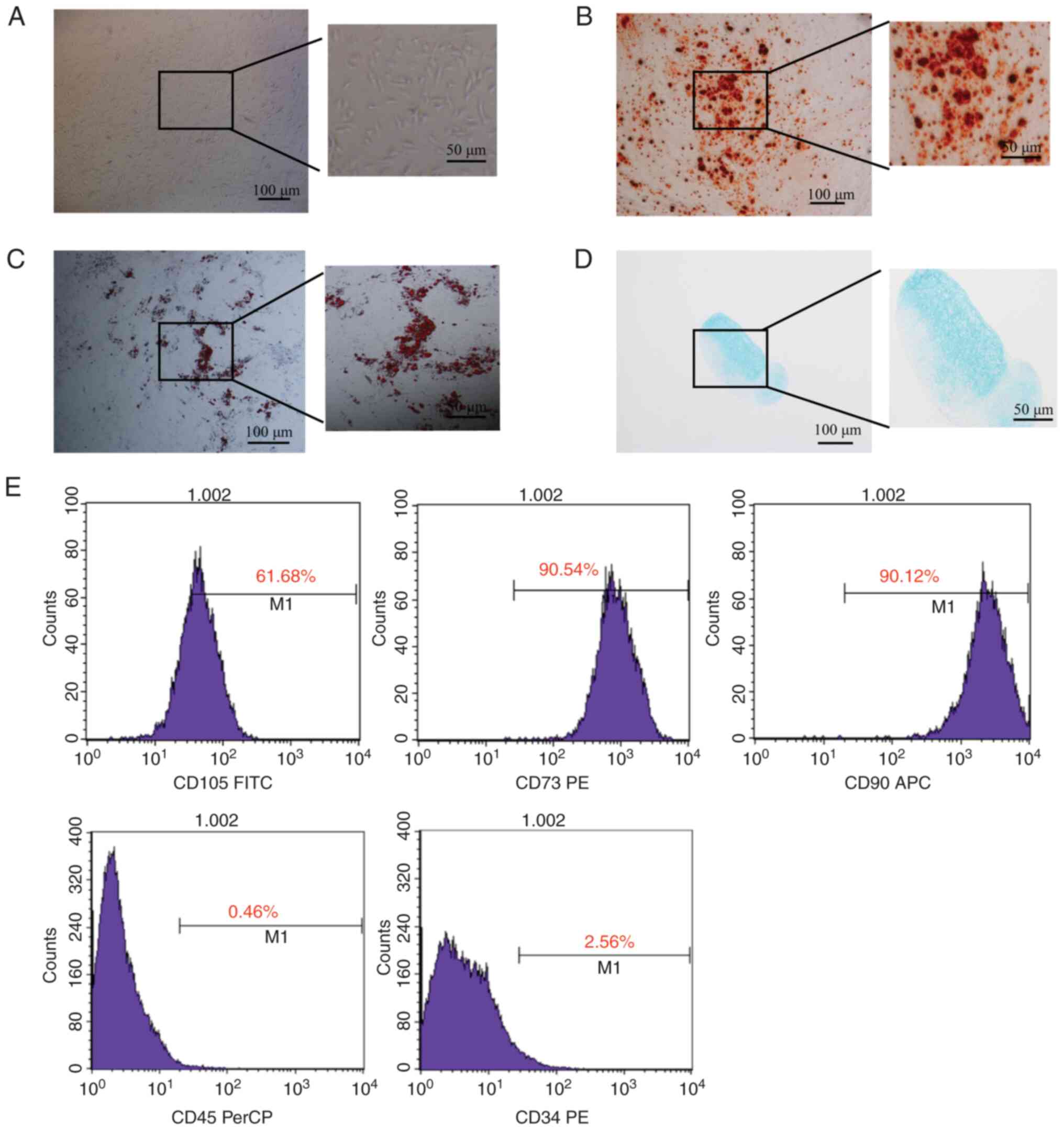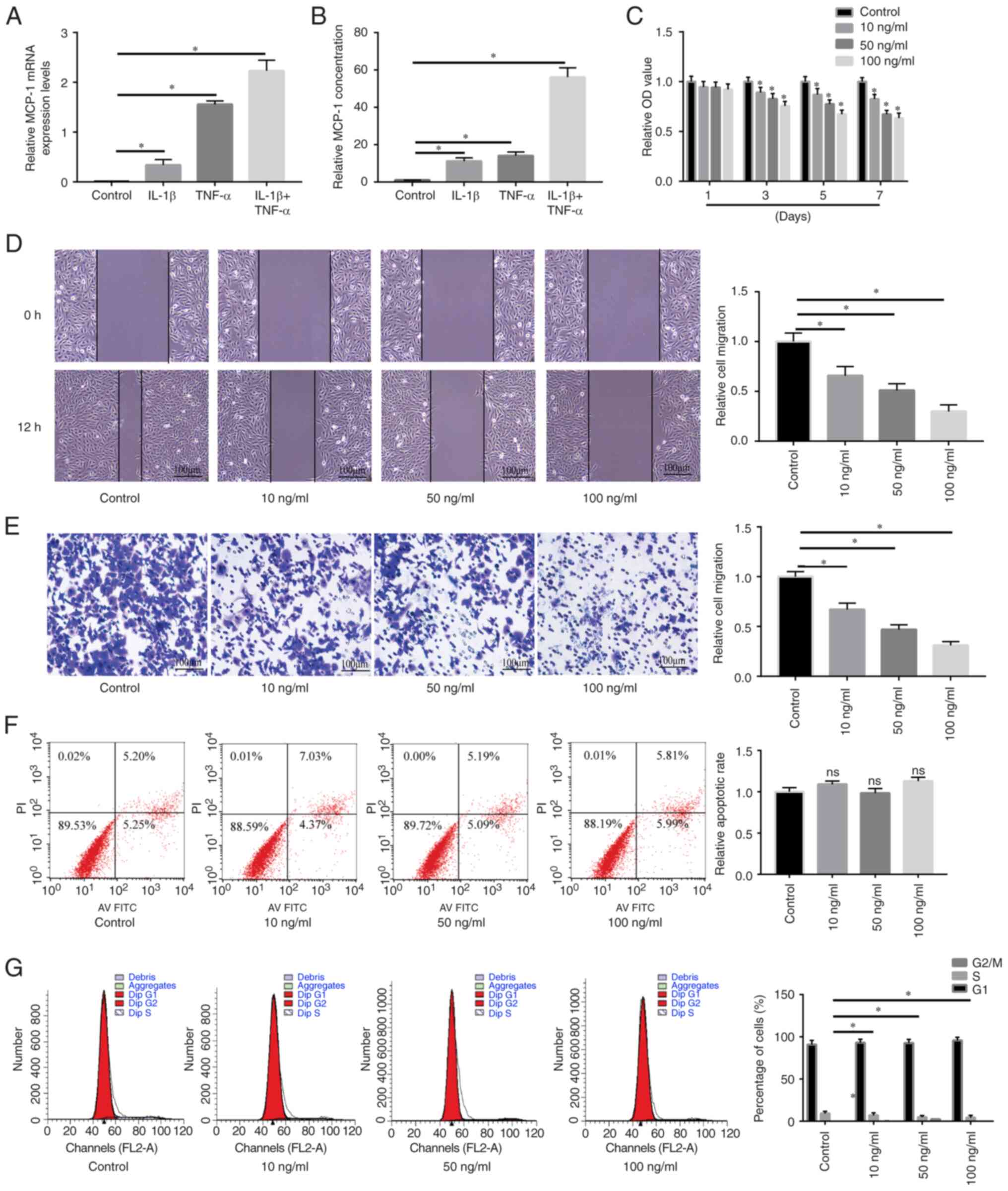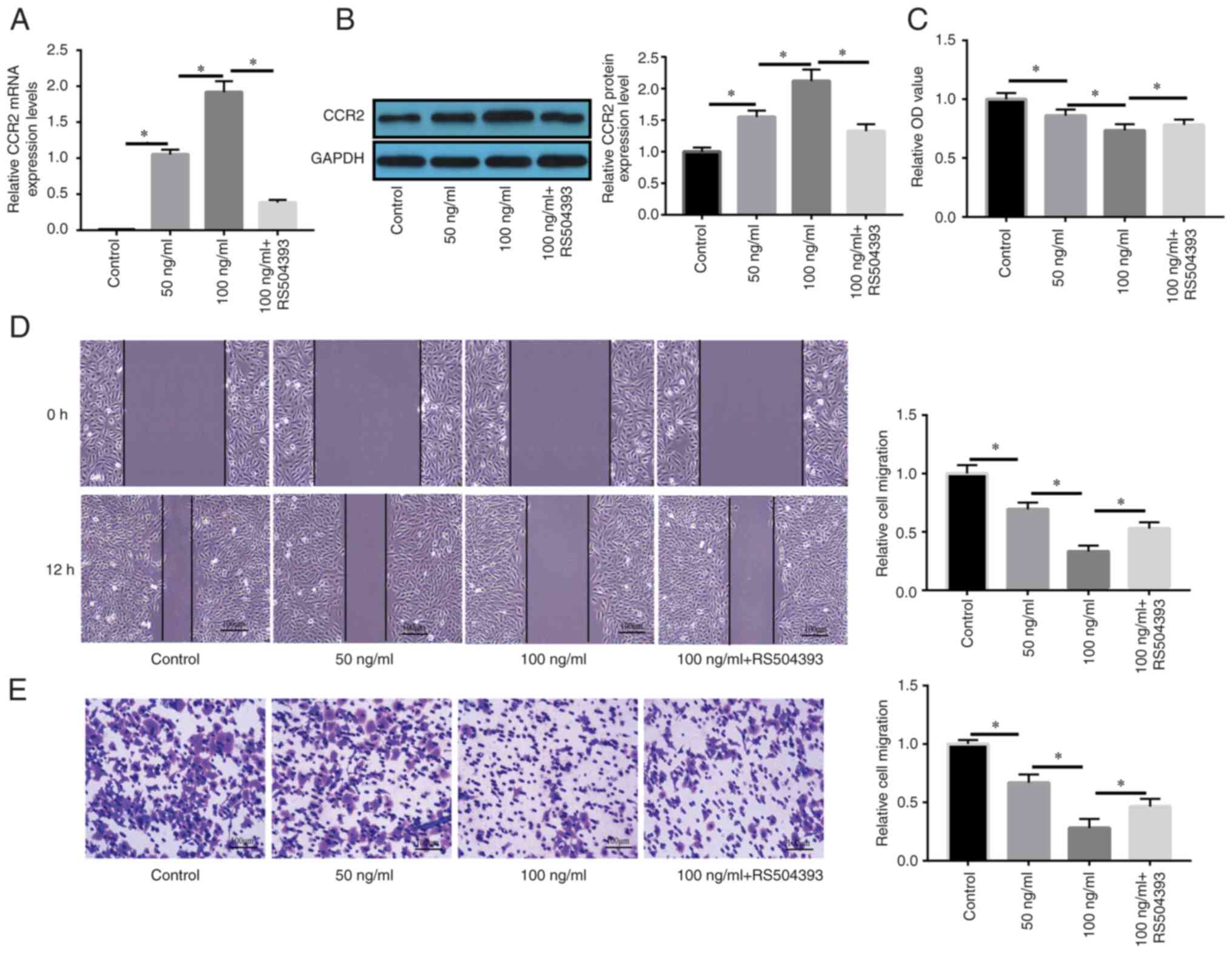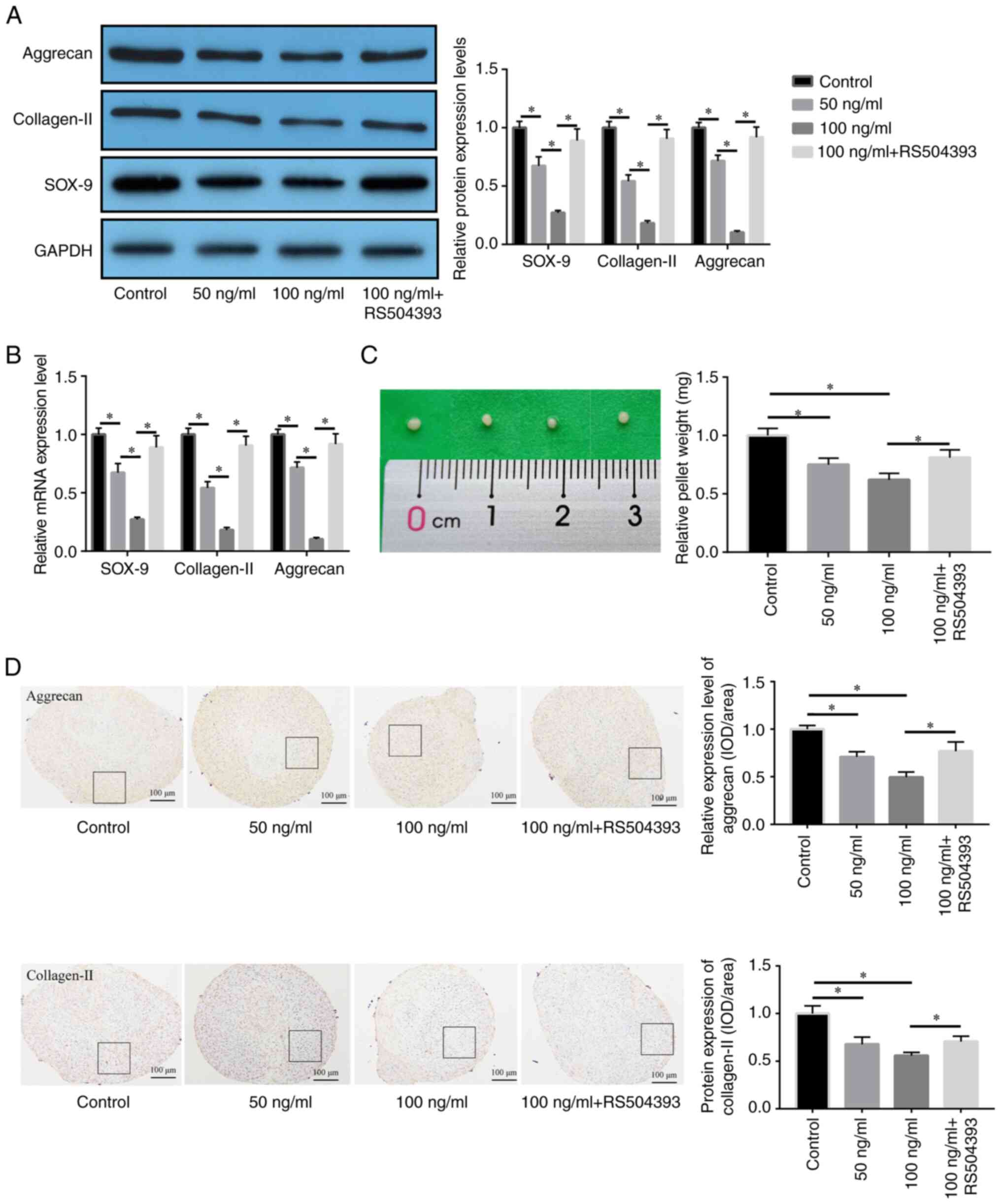|
1
|
Chan WC, Sze KL, Samartzis D, Leung VY and
Chan D: Structure and biology of the intervertebral disk in health
and disease. Orthop Clin North Am. 42:447–464. 2011. View Article : Google Scholar : PubMed/NCBI
|
|
2
|
González Martínez E, García-Cosamalón J,
Cosamalón-Gan I, Esteban Blanco M, García-Suarez O and Vega JA:
Biology and mechanobiology of the intervertebral disc. Neurocirugia
(Astur). 28:135–140. 2017.(In Spanish). View Article : Google Scholar
|
|
3
|
Middendorp M, Vogl TJ, Kollias K,
Kafchitsas K, Khan MF and Maataoui A: Association between
intervertebral disc degeneration and the Oswestry disability index.
J Back Musculoskelet Rehabil. 30:819–823. 2017. View Article : Google Scholar
|
|
4
|
Liu Y, Li Y, Nan LP, Wang F, Zhou SF, Feng
XM, Liu H and Zhang L: Insights of stem cell-based endogenous
repair of intervertebral disc degeneration. World J Stem Cells.
12:266–276. 2020. View Article : Google Scholar : PubMed/NCBI
|
|
5
|
Vinante F and Rigo A: Heparin-binding
epidermal growth factor-like growth factor/diphtheria toxin
receptor in normal and neoplastic hematopoiesis. Toxins (Basel).
5:1180–1201. 2013. View Article : Google Scholar : PubMed/NCBI
|
|
6
|
Gunasekaran A, de Los Reyes NKM, Walters J
and Kazemi N: Clinical presentation, diagnosis, and surgical
treatment of spontaneous cervical intradural disc herniations: A
review of the literature. World Neurosurg. 109:275–284. 2018.
View Article : Google Scholar : PubMed/NCBI
|
|
7
|
Lofrese G, Mongardi L, Cultrera F,
Trapella G and De Bonis P: Surgical treatment of
intraforaminal/extraforaminal lumbar disc herniations: Many
approaches for few surgical routes. Acta Neurochir (Wien).
159:1273–1281. 2017. View Article : Google Scholar : PubMed/NCBI
|
|
8
|
Gillet P: The fate of the adjacent motion
segments after lumbar fusion. J Spinal Disord Tech. 16:338–345.
2003. View Article : Google Scholar : PubMed/NCBI
|
|
9
|
May M: Regenerative medicine: Rebuilding
the backbone. Nature. 503:S7–S9. 2013. View
Article : Google Scholar : PubMed/NCBI
|
|
10
|
Roberts S, Evans H, Trivedi J and Menage
J: Histology and pathology of the human intervertebral disc. J Bone
Joint Surg Am. 88 (Suppl 2):S10–S14. 2006. View Article : Google Scholar
|
|
11
|
Wang R, Luo D, Li Z and Han H: Dimethyl
fumarate ameliorates nucleus pulposus cell dysfunction through
activating the Nrf2/HO-1 pathway in intervertebral disc
degeneration. Comput Math Methods Med. 2021:60217632021.PubMed/NCBI
|
|
12
|
Colombier P, Clouet J, Hamel O, Lescaudron
L and Guicheux J: The lumbar intervertebral disc: from embryonic
development to degeneration. Joint Bone Spine. 81:125–129. 2014.
View Article : Google Scholar : PubMed/NCBI
|
|
13
|
Hughes SP, Freemont AJ, Hukins DW,
McGregor AH and Roberts S: The pathogenesis of degeneration of the
intervertebral disc and emerging therapies in the management of
back pain. J Bone Joint Surg Br. 94:1298–1304. 2012. View Article : Google Scholar : PubMed/NCBI
|
|
14
|
Sivakamasundari V and Lufkin T: Stemming
the degeneration: IVD stem cells and stem cell regenerative therapy
for degenerative disc disease. Adv Stem Cells.
2013:7245472013.PubMed/NCBI
|
|
15
|
Risbud MV, Guttapalli A, Tsai TT, Lee JY,
Danielson KG, Vaccaro AR, Albert TJ, Gazit Z, Gazit D and Shapiro
IM: Evidence for skeletal progenitor cells in the degenerate human
intervertebral disc. Spine (Phila Pa 1976). 32:2537–2544. 2007.
View Article : Google Scholar : PubMed/NCBI
|
|
16
|
Blanco JF, Graciani IF, Sanchez-Guijo FM,
Muntión S, Hernandez-Campo P, Santamaria C, Carrancio S, Barbado
MV, Cruz G, Gutierrez-Cosío S, et al: Isolation and
characterization of mesenchymal stromal cells from human
degenerated nucleus pulposus: Comparison with bone marrow
mesenchymal stromal cells from the same subjects. Spine (Phila Pa
1976). 35:2259–2265. 2010. View Article : Google Scholar : PubMed/NCBI
|
|
17
|
Zhao Y, Jia Z, Huang S, Wu Y, Liu L, Lin
L, Wang D, He Q and Ruan D: Age-related changes in nucleus pulposus
mesenchymal stem cells: An in vitro study in rats. Stem Cells Int.
2017:67615722017. View Article : Google Scholar
|
|
18
|
Urban JP: The role of the physicochemical
environment in determining disc cell behaviour. Biochem Soc Trans.
30:858–864. 2002. View Article : Google Scholar : PubMed/NCBI
|
|
19
|
Liu ZJ, Zhuge Y and Velazquez OC:
Trafficking and differentiation of mesenchymal stem cells. J Cell
Biochem. 106:984–991. 2009. View Article : Google Scholar : PubMed/NCBI
|
|
20
|
Vanden Berg-Foels WS: In situ tissue
regeneration: Chemoattractants for endogenous stem cell
recruitment. Tissue Eng Part B Rev. 20:28–39. 2014. View Article : Google Scholar : PubMed/NCBI
|
|
21
|
Wang J, Markova D, Anderson DG, Zheng Z,
Shapiro IM and Risbud MV: TNF-α and IL-1β promote a
disintegrin-like and metalloprotease with thrombospondin type I
motif-5-mediated aggrecan degradation through syndecan-4 in
intervertebral disc. J Biol Chem. 286:39738–39749. 2011. View Article : Google Scholar : PubMed/NCBI
|
|
22
|
Ou X, Ying J, Bai X, Wang C and Ruan D:
Activation of SIRT1 promotes cartilage differentiation and reduces
apoptosis of nucleus pulposus mesenchymal stem cells via the
MCP1/CCR2 axis in subjects with intervertebral disc degeneration.
Int J Mol Med. 46:1074–1084. 2020. View Article : Google Scholar : PubMed/NCBI
|
|
23
|
Ferreira JR, Teixeira GQ, Neto E,
Ribeiro-Machado C, Silva AM, Caldeira J, Pereira CL, Bidarra S,
Maia AF, Lamghari M, et al: IL-1β-pre-conditioned mesenchymal
stem/stromal cells' secretome modulates the inflammatory response
and aggrecan deposition in intervertebral disc. Eur Cell Mater.
41:431–453. 2021. View Article : Google Scholar : PubMed/NCBI
|
|
24
|
Cai WT, Guan P, Lin MX, Fu B and Wu B:
Sirt1 suppresses MCP-1 production during the intervertebral disc
degeneration by inactivating AP-1 subunits c-Fos/c-Jun. Eur Rev Med
Pharmacol Sci. 24:5895–5904. 2020.
|
|
25
|
Takayama Y, Ando T, Ichikawa J and Haro H:
Effect of thrombin-induced MCP-1 and MMP-3 production via PAR1
expression in murine intervertebral discs. Sci Rep. 8:113202018.
View Article : Google Scholar : PubMed/NCBI
|
|
26
|
Yaghooti H, Mohammadtaghvaei N and
Mahboobnia K: Effects of palmitate and astaxanthin on cell
viability and proinflammatory characteristics of mesenchymal stem
cells. Int Immunopharmacol. 68:164–170. 2019. View Article : Google Scholar
|
|
27
|
Cao M, Liu H, Dong Y, Liu W, Yu Z, Wang Q,
Wang Q, Liang Z, Li Y and Ren H: Mesenchymal stem cells alleviate
idiopathic pneumonia syndrome by modulating T cell function through
CCR2-CCL2 axis. Stem Cell Res Ther. 12:3782021. View Article : Google Scholar : PubMed/NCBI
|
|
28
|
Ferland-McCollough D, Maselli D, Spinetti
G, Sambataro M, Sullivan N, Blom A and Madeddu P: MCP-1 feedback
loop between adipocytes and mesenchymal stromal cells causes fat
accumulation and contributes to hematopoietic stem cell rarefaction
in the bone marrow of patients with diabetes. Diabetes.
67:1380–1394. 2018. View Article : Google Scholar : PubMed/NCBI
|
|
29
|
Sun C, Li X, Guo E, Li N, Zhou B, Lu H,
Huang J, Xia M, Shan W, Wang B, et al: MCP-1/CCR-2 axis in
adipocytes and cancer cell respectively facilitates ovarian cancer
peritoneal metastasis. Oncogene. 39:1681–1695. 2020. View Article : Google Scholar : PubMed/NCBI
|
|
30
|
Yadav A, Saini V and Arora S: MCP-1:
chemoattractant with a role beyond immunity: A review. Clin Chim
Acta. 411:1570–1579. 2010. View Article : Google Scholar
|
|
31
|
Livak KJ and Schmittgen TD: Analysis of
relative gene expression data using real-time quantitative PCR and
the 2(−Delta Delta C(T)) method. Methods. 25:402–408. 2001.
View Article : Google Scholar : PubMed/NCBI
|
|
32
|
Wang HC, Jin CH, Kong J, Yu T, Guo JW, Hu
YG and Liu Y: The research of transgenic human nucleus pulposus
cell transplantation in the treatment of lumbar disc degeneration.
Kaohsiung J Med Sci. 35:486–492. 2019.
|
|
33
|
Iwashina T, Mochida J, Sakai D, Yamamoto
Y, Miyazaki T, Ando K and Hotta T: Feasibility of using a human
nucleus pulposus cell line as a cell source in cell transplantation
therapy for intervertebral disc degeneration. Spine (Phila Pa
1976). 31:1177–1186. 2006. View Article : Google Scholar : PubMed/NCBI
|
|
34
|
Wuertz K, Godburn K, Neidlinger-Wilke C,
Urban J and Iatridis JC: Behavior of mesenchymal stem cells in the
chemical microenvironment of the intervertebral disc. Spine (Phila
Pa 1976). 33:1843–1849. 2008. View Article : Google Scholar : PubMed/NCBI
|
|
35
|
Sun K, Jing X, Guo J, Yao X and Guo F:
Mitophagy in degenerative joint diseases. Autophagy. 17:2082–2092.
2021. View Article : Google Scholar : PubMed/NCBI
|
|
36
|
Tessier S and Risbud MV: Understanding
embryonic development for cell-based therapies of intervertebral
disc degeneration: Toward an effort to treat disc degeneration
subphenotypes. Dev Dyn. 250:302–317. 2020. View Article : Google Scholar : PubMed/NCBI
|
|
37
|
Andreas K, Sittinger M and Ringe J: Toward
in situ tissue engineering: Chemokine-guided stem cell recruitment.
Trends Biotechnol. 32:483–492. 2014. View Article : Google Scholar
|
|
38
|
Li Z, Peroglio M, Alini M and Grad S:
Potential and limitations of intervertebral disc endogenous repair.
Curr Stem Cell Res Ther. 10:329–338. 2015. View Article : Google Scholar : PubMed/NCBI
|
|
39
|
Tsutsumi-Kuroda U, Inoue T, Futakuchi A,
Shobayashi K, Takahashi E, Kojima S, Inoue-Mochita M, Fujimoto T
and Tanihara H: Decreased MCP-1/CCR2 axis-mediated chemotactic
effect of conjunctival fibroblasts after transdifferentiation into
myofibroblasts. Exp Eye Res. 170:76–80. 2018. View Article : Google Scholar : PubMed/NCBI
|
|
40
|
Xu L, Sharkey D and Cantley LG: Tubular
GM-CSF promotes late MCP-1/CCR2-mediated fibrosis and inflammation
after ischemia/reperfusion injury. J Am Soc Nephrol. 30:1825–1840.
2019. View Article : Google Scholar
|
|
41
|
Schroeder M, Viezens L, Schaefer C,
Friedrichs B, Algenstaedt P, Rüther W, Wiesner L and
Hansen-Algenstaedt N: Chemokine profile of disc degeneration with
acute or chronic pain. J Neurosurg Spine. 18:496–503. 2013.
View Article : Google Scholar : PubMed/NCBI
|
|
42
|
Scuderi GJ, Brusovanik GV, Anderson DG,
Dunham CJ, Vaccaro AR, Demeo RF and Hallab N: Cytokine assay of the
epidural space lavage in patients with lumbar intervertebral disk
herniation and radiculopathy. J Spinal Disord Tech. 19:266–269.
2006. View Article : Google Scholar : PubMed/NCBI
|
|
43
|
Boomsma RA and Geenen DL: Mesenchymal stem
cells secrete multiple cytokines that promote angiogenesis and have
contrasting effects on chemotaxis and apoptosis. PLoS One.
7:e356852012. View Article : Google Scholar : PubMed/NCBI
|
|
44
|
Mastrolia I, Foppiani EM, Murgia A,
Candini O, Samarelli AV, Grisendi G, Veronesi E, Horwitz EM and
Dominici M: Challenges in clinical development of mesenchymal
stromal/stem cells: Concise review. Stem Cells Transl Med.
8:1135–1148. 2019. View Article : Google Scholar : PubMed/NCBI
|
|
45
|
Frenette PS, Pinho S, Lucas D and
Scheiermann C: Mesenchymal stem cell: Keystone of the hematopoietic
stem cell niche and a stepping-stone for regenerative medicine.
Annu Rev Immunol. 31:285–316. 2013. View Article : Google Scholar
|
|
46
|
Kang SK, Shin IS, Ko MS, Jo JY and Ra JC:
Journey of mesenchymal stem cells for homing: strategies to enhance
efficacy and safety of stem cell therapy. Stem Cells Int.
2012:3429682012. View Article : Google Scholar
|
|
47
|
Augello A, Kurth TB and De Bari C:
Mesenchymal stem cells: A perspective from in vitro cultures to in
vivo migration and niches. Eur Cell Mater. 20:121–133. 2010.
View Article : Google Scholar : PubMed/NCBI
|
|
48
|
Fan XL, Zhang Z, Ma CY and Fu QL:
Mesenchymal stem cells for inflammatory airway disorders: Promises
and challenges. Biosci Rep. 39:BSR201821602019. View Article : Google Scholar : PubMed/NCBI
|
|
49
|
Petit I, Jin D and Rafii S: The
SDF-1-CXCR4 signaling pathway: A molecular hub modulating
neo-angiogenesis. Trends Immunol. 28:299–307. 2007. View Article : Google Scholar
|
|
50
|
Humbert P, Brennan MA, Davison N, Rosset
P, Trichet V, Blanchard F and Layrolle P: Immune modulation by
transplanted calcium phosphate biomaterials and human mesenchymal
stromal cells in bone regeneration. Front Immunol. 10:6632019.
View Article : Google Scholar
|


















